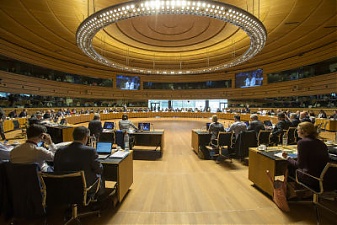Baltic States – CIS, EU – Baltic States, Latvia, Legislation, Transport
International Internet Magazine. Baltic States news & analytics
Friday, 26.04.2024, 13:44
Latvian MFA in Luxembourg: Georgia has fulfilled the requirements for visa-free travel
 Print version
Print version |
|---|
In a discussion on the Arctic region, EU Foreign Ministers were briefed about a Joint Communication by the European Commission (EC) and the High Representative for Foreign Affairs and Security Policy, Federica Mogherini, on an integrated European Union policy for the Arctic.
Edgars Rinkevics expressed conviction that due to climate change, the opening of a marine traffic corridor, the Northeast Passage, has changed an approach to security and defence issued in the Arctic region. Therefore, it is important for Latvia that balance is retained in the region also in military matters on the basis of international law and the region’s international importance.
Latvia supports a more active and coordinated EU engagement with the Arctic region, given its increasing strategic importance. In view of the major role of the Arctic Council in regional cooperation, the EU being granted an observer status in the Arctic Council would promote a more effective involvement of the EU in the Arctic cooperation, the Minister emphasised.
The Latvian Foreign Minister also said that Latvia supports the perspective of the EC and the High Representative on priority areas for the EU’s engagement in the Arctic: climate change and safeguarding the Arctic environment; sustainable development in and around the Arctic; and international cooperation on Arctic issues.
On a joint initiative from the ministers of the interior and foreign affairs of the Baltic States, Bulgaria and Romania, the subject of the visa liberalisation for citizens of Georgia had been included in a political discussion of the Council.
Edgars Rinkevics emphasised that Georgia has fulfilled the requirements for visa-free travel. Latvia is certain that the suspension mechanism approved and the preparedness expressed by Georgian law enforcement authorities for cooperation with the EU is sufficient grounds for taking a decision on a visa–free regime for Georgian nationals. The delay on a decision to allow visa-free travel could reduce Georgia’s resilience to pressures from countries, which have a negative attitude towards the Eastern Partnership, stressed the Minister.
Edgars Rinkevics drew attention to mobility as a vital aspect of the Eastern Partnership policy; therefore, the EU Member States’ inability to decide on the issue of granting visa-free travel to Georgia could interfere with successful implementation of the Eastern Partnership policy as a whole. Visa liberalisation will prove that the EU is trustworthy and capable of consistently implementing the decisions made at the Riga Summit. It is vital to remember that not only partner countries but also the EU ought to meet its commitments, Edgars Rinkevics noted in conclusion.
In the run-up to the Foreign Affairs Council in Luxembourg, Foreign Minister Rinkevics also hosted a working breakfast for the Baltic and Nordic Foreign Ministers to exchange views on developments in Ukraine and visa liberalisation for Georgian nationals.
The meetings of the Foreign Affairs Council are held on a monthly basis and are chaired by the EU High Representative for Foreign Policy and Security Policy, Federica Mogherini.








 «The Baltic Course» Is Sold and Stays in Business!
«The Baltic Course» Is Sold and Stays in Business!

